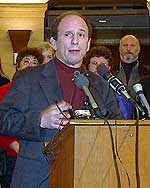By Mark Zdechlik
Minnesota Public Radio
October 16, 2002
The focus in Minnesota's U.S. Senate race has shifted from the issue of war with Iraq to domestic economic concerns. Front runners Republican Norm Coleman and DFL Sen. Paul Wellstone are both talking up plans to revive the nation's economy.
| |
|
|
|
||
Surrounded by business leaders packed into a tiny conference room at a St. Paul hotel, Republican Norm Coleman recieved an enthusiastic show of support from several business groups whose members are unhappy with DFL Sen. Paul Wellstone.
Dale Zoerb heads up the political action committee for the Minnesota chapter of the Associated Builders and Contractors.
"We're tired of the frantic ranting and wrangling of this angry little wrestler," says Zoerb. "We need someone with a proven record of bringing people together, working with unions and non-unions alike, and on all sides of small business issues ... working with small business and Fortune 500 companies. We need someone that can get things done in Washington."
Coleman is proud of his close ties to business, and he credits those relationships with helping him accomplish much of the recent economic development in St. Paul.
Coleman says there exists a sharp divide between his vision for job creation and Wellstone's.
"My record is one of cutting taxes and keeping lids on unnecessary regulation, investing where you need to invest," says Coleman. "Invest in infrastructure. Deal with those who have needs, there's no question about that -- but you can't be anti-business, you can't be pro-jobs."
| |
|
|
|
||
Coleman thinks the Bush administration is on the right track, that the $1.3 trillion tax cuts passed last year will spur economic growth and create jobs.
Wellstone says the Republican tax cuts disproportionately benefit big businesses and the wealthiest Americans. Wellstone says additional tax decreases, scheduled to take effect in 2004 and 2006, should be redirected toward middle and low-income Americans.
Wellstone accuses the Bush administration of neglecting the economy.
"This administration is just sleepwalking through history. They just are not at all focused on it," says Wellstone.
At the most recent debate, Wellstone trumpeted as sound policy the economic recovery act that barely passed the Senate in early 1990s. It included the largest tax hike in U.S. history, and Wellstone says the bill helped create hundreds of thousands of jobs.
"I don't believe in a policy where you basically support big corporations not paying their fair share. I think we have to put people first again," Wellstone said. "I think we've got to make sure that the small investors know that the books aren't cooked, and they've got some confidence when they make investments. I've always been a watchdog for Minnesota versus those big economic interests."
Wellstone is not calling for tax increases this time. But he does want unemployment benefits extended by more than three months, and he wants a $1.50 per hour increase in the minimum wage. Additionally, Wellstone is calling for education tax credits and more worker training.
Coleman says he too supports increasing the minimum wage and extending unemployment benefits. Coleman says Wellstone's criticism of tax cuts amounts to class warfare.
The recent shift in the debate from Iraq to the economy is no surprise, because Americans often cast their votes based largely on pocketbook issues.
In less than a month, Minnesota voters will decide whether Paul Wellstone or Norm Coleman has the best approach to bring back more prosperous times.
More from MPR

